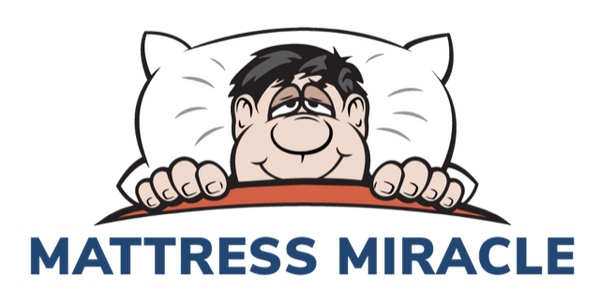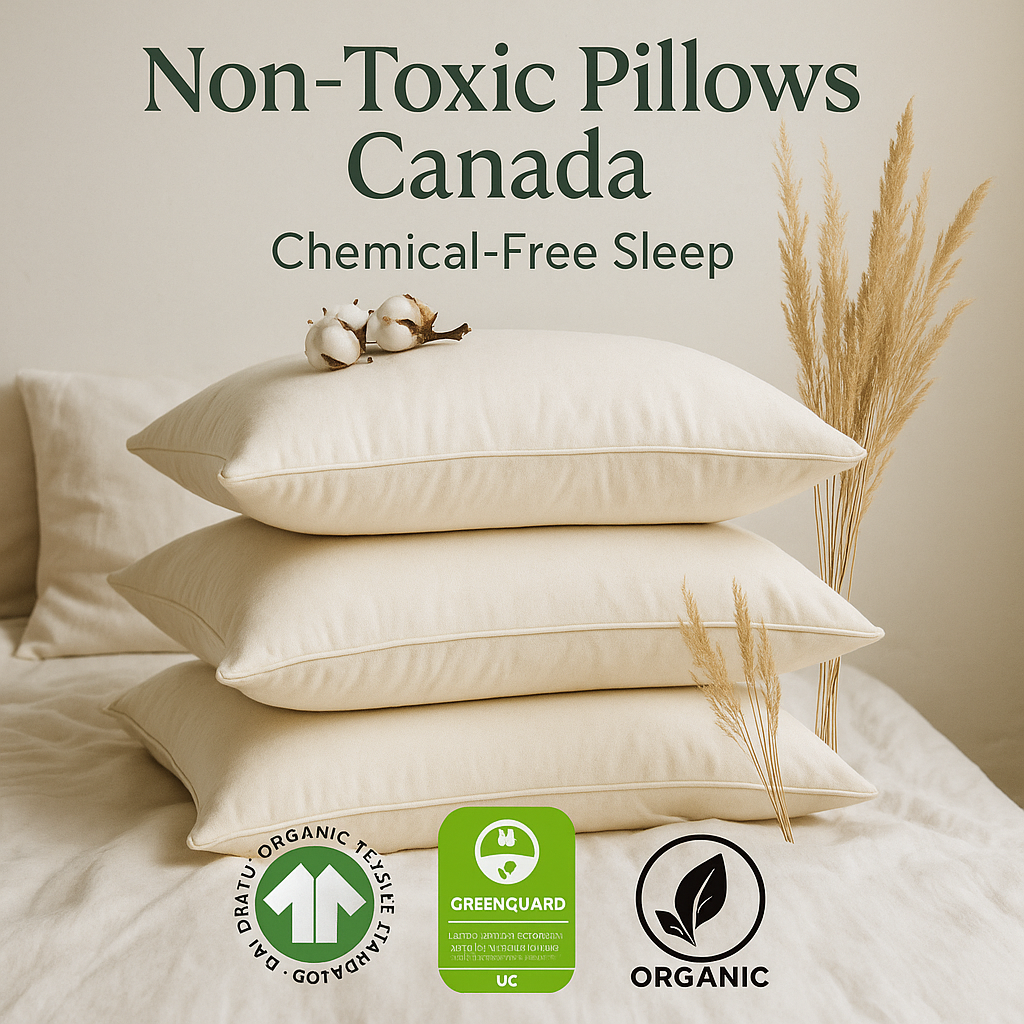Non-Toxic Pillows Canada: Chemical-Free Sleep Solutions
Natura Organic Pillows Complete Guide:
🏠 Complete Guide Hub - All 13 Articles
Finding truly non-toxic pillows in Canada has become critical as awareness grows about harmful chemicals in bedding. At Mattress Miracle in Brantford, we've been helping Canadian families avoid pillow toxins since 1987, long before "chemical-free" became a trend.
After three decades of educating customers about pillow safety, we've witnessed concerning health improvements when people switch from synthetic to non-toxic pillows. This comprehensive guide reveals which pillow chemicals to avoid and why Natura's non-toxic pillows represent the safest choice for Canadian families.
Toxic Chemicals Commonly Found in Canadian Pillows
Most Canadians are unaware of the chemical cocktail present in conventional pillows. Health Canada has limited regulations on bedding chemicals, making consumer awareness essential for protection.
Memory Foam Chemicals (Polyurethane-Based)
Synthetic memory foam contains multiple concerning compounds:
- Toluene Diisocyanate (TDI): Linked to respiratory issues and skin irritation
- Formaldehyde: Known carcinogen that off-gases for years
- Methylene Chloride: Potential central nervous system depressant
- Trichloroethane: Linked to liver and kidney damage
Flame Retardant Chemicals
Canadian fire safety regulations often require chemical flame retardants in synthetic pillows:
- Polybrominated Diphenyl Ethers (PBDEs): Hormone disruptors that accumulate in body tissues
- Chlorinated Tris: Probable carcinogen banned in children's sleepwear
- Antimony Trioxide: Possible carcinogen used as flame retardant synergist
Polyester Fill Chemicals
Synthetic polyester pillows contain petroleum-derived chemicals:
- Volatile Organic Compounds (VOCs): Cause headaches and respiratory irritation
- Antimicrobial Treatments: Often contain silver nanoparticles or triclosan
- Synthetic Dyes: May contain heavy metals and carcinogenic compounds
🏥 Health Symptoms Linked to Toxic Pillow Exposure
Canadian clients frequently report these symptoms before switching to non-toxic pillows:
- Respiratory Issues: Morning congestion, throat irritation, coughing
- Neurological Symptoms: Headaches, dizziness, brain fog
- Skin Problems: Facial rashes, eczema flare-ups, acne
- Sleep Disruption: Restless sleep, frequent waking, insomnia
- Hormonal Effects: Irregular cycles, fertility concerns
Note: Symptoms often improve within 2-4 weeks of switching to non-toxic pillows.
Why Natural Materials Are Inherently Non-Toxic
Nature provides inherently safe pillow materials that require no chemical treatments to achieve desired properties.
100% Natural Latex: The Gold Standard
Natural latex from rubber trees offers exceptional safety:
- No Chemical Processing: Natura uses only natural Talalay latex with mineral-based curing
- Naturally Fire Resistant: No flame retardant chemicals needed
- Antimicrobial Properties: Resists bacteria and mold without chemical treatments
- Biodegradable: Returns to nature safely at end of life
Organic Cotton: Chemical-Free Comfort
GOTS-certified organic cotton eliminates agricultural toxins:
- No Pesticides: Grown without synthetic pesticides or herbicides
- No Synthetic Fertilizers: Uses natural composting methods
- No Bleaching: Naturally white or unbleached
- No Formaldehyde Treatments: Avoids wrinkle-resistant chemicals
Organic Wool: Natural Protection
Organic wool provides unique non-toxic benefits:
- Natural Flame Resistance: Self-extinguishing without chemicals
- No Synthetic Treatments: No moth-proofing or anti-static chemicals
- Temperature Regulation: Natural breathability without synthetic coatings
- Hypoallergenic: Natural lanolin provides gentle antimicrobial protection
Natura's Non-Toxic Pillow Manufacturing Process
Natura's commitment to non-toxic production sets them apart from conventional pillow manufacturers:
🔬 Natura's Chemical-Free Process
Latex Core Production:
- 100% natural rubber tree sap (no synthetic latex blends)
- Natural soap and mineral-based gelling agents only
- Multiple washing cycles remove all processing residues
- No chemical accelerators or synthetic stabilizers
Organic Cover Manufacturing:
- GOTS-certified organic cotton exclusively
- Natural fiber dyes or undyed cotton only
- No chemical sizing or finishing treatments
- Mechanical processing instead of chemical softening
Canadian Regulations vs. Reality
While Health Canada provides some oversight, many toxic chemicals remain legal in bedding:
Current Canadian Bedding Regulations
- Textile Labelling Act: Requires fiber content disclosure but not chemical treatments
- Consumer Product Safety Act: Prohibits only the most dangerous chemicals
- Hazardous Products Regulations: Limited coverage of bedding chemicals
Regulatory Gaps
- No mandatory testing for VOC emissions in pillows
- Limited restrictions on flame retardant chemicals
- No requirement to disclose processing chemicals
- Minimal oversight of imported bedding products
💡 Consumer Protection Strategy
Since regulations are limited, Canadian consumers must:
- Research materials and manufacturing processes
- Look for third-party certifications (GOTS, GOLS)
- Choose transparent manufacturers like Natura
- Buy from knowledgeable retailers who understand toxicity
Identifying Non-Toxic Pillow Certifications
Third-party certifications provide the best assurance of non-toxic status:
Essential Certifications for Non-Toxic Pillows
🏅 GOLS (Global Organic Latex Standard)
- Certifies 95%+ organic latex content
- Prohibits synthetic latex and chemical additives
- Requires environmental and social criteria compliance
- Annual inspections ensure ongoing compliance
🏅 GOTS (Global Organic Textile Standard)
- Certifies 70%+ organic fiber content
- Restricts harmful chemical use in processing
- Requires environmental and social criteria
- Covers entire supply chain from raw materials to final product
🏅 GREENGUARD Gold
- Tests for over 10,000 chemicals and VOCs
- Ensures low chemical emissions for indoor air quality
- Particularly important for children and sensitive individuals
- Ongoing testing maintains certification validity
Non-Toxic Pillow Shopping Guide for Canadians
Use this systematic approach to identify truly non-toxic pillows:
Questions to Ask Retailers
- Material Composition: What exact materials are used in fill and cover?
- Chemical Treatments: Are any chemicals applied during manufacturing?
- Flame Retardants: How does the pillow meet fire safety requirements?
- Certifications: Which third-party certifications does the pillow hold?
- Manufacturing Location: Where is the pillow made and by whom?
- Off-Gassing: Will the pillow emit any odors when new?
Red Flags to Avoid
- "Natural" without certification: Marketing term with no regulatory meaning
- Strong chemical odors: Indicates ongoing off-gassing
- Vague material descriptions: "Proprietary foam blend" or "treated materials"
- No certifications: Lack of third-party verification
- Extremely low prices: Often indicates synthetic, chemical-laden materials
The True Cost of Toxic Pillow Exposure
While non-toxic pillows cost more upfront, the long-term savings are significant:
| Cost Factor | Toxic Synthetic Pillow | Non-Toxic Natura Pillow |
|---|---|---|
| Initial Cost | $30-80 CAD | $200-350 CAD |
| Replacement Frequency | Every 1-3 years | Every 15-20 years |
| Health Costs | Potential medical expenses from chemical exposure | Avoided health issues and better sleep quality |
| 20-Year Total Cost | $200-530 CAD + health impacts | $200-350 CAD + health benefits |
| Environmental Impact | 7-20 pillows in landfill | 1 biodegradable pillow |
Frequently Asked Questions About Non-Toxic Pillows
How long does it take to see health benefits after switching to non-toxic pillows?
Most clients notice improvements within 1-2 weeks. Respiratory symptoms often improve first, followed by better sleep quality. Skin improvements typically take 3-4 weeks as your system clears accumulated toxins.
Are non-toxic pillows safe for babies and children?
Yes, non-toxic pillows are especially important for children whose developing systems are more vulnerable to chemicals. However, follow safe sleep guidelines - no pillows for infants under 12 months.
Do non-toxic pillows meet Canadian fire safety requirements?
Yes, natural materials like wool and latex are inherently fire-resistant without chemical treatments. Natura pillows meet all Canadian safety standards through material properties, not chemical additives.
Can people with multiple chemical sensitivity (MCS) use non-toxic pillows?
Absolutely. Many MCS clients find significant relief with certified non-toxic pillows. We recommend starting with 100% natural latex and organic cotton covers, which have the lowest chemical load.
How can I verify a pillow is truly non-toxic?
Look for multiple certifications (GOLS, GOTS, GREENGUARD), transparent ingredient lists, and manufacturers willing to discuss their processes. If there's any secrecy about materials or manufacturing, consider it a red flag.
Do non-toxic pillows require special care to maintain their safety?
Non-toxic pillows are actually easier to maintain safely. Use natural detergents, avoid fabric softeners, and air dry when possible. The absence of chemical treatments means there's nothing to preserve through special care.
Why Choose Mattress Miracle for Non-Toxic Pillows
Our 37+ years of expertise in healthy sleep makes us Brantford's leading authority on non-toxic bedding:
🏆 Our Non-Toxic Pillow Expertise
- Chemical Knowledge: Trained staff understands pillow toxicity and health impacts
- Certification Verification: We verify all certifications and understand their meanings
- Health-First Approach: Priority on customer health over sales volume
- Local Support: Available for questions and concerns after purchase
- Transparent Information: Complete disclosure of materials and manufacturing
Ready for Chemical-Free Sleep?
Experience the difference of truly non-toxic sleep. Visit our Brantford showroom to test certified non-toxic pillows and speak with our chemical-free sleep specialists.
Shop Non-Toxic Pillows
